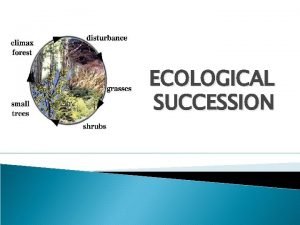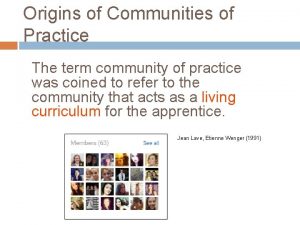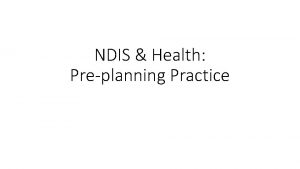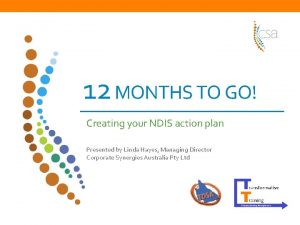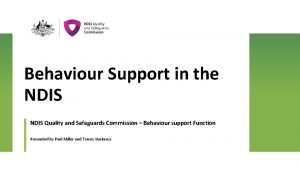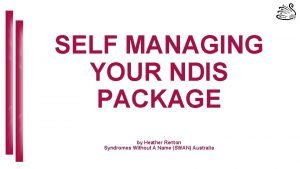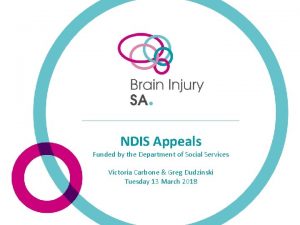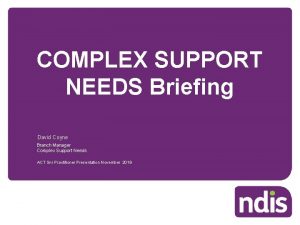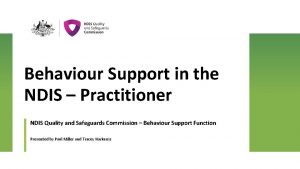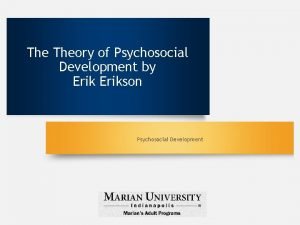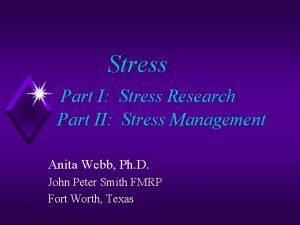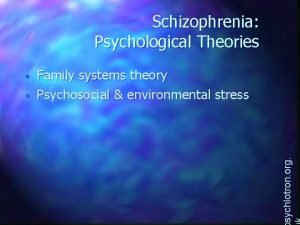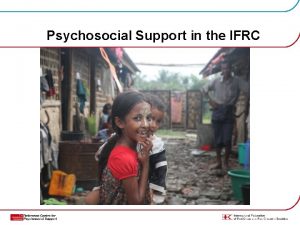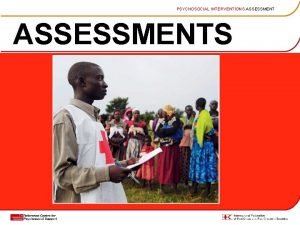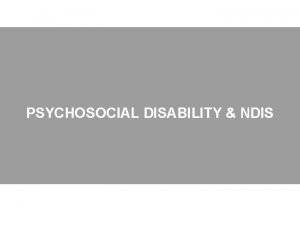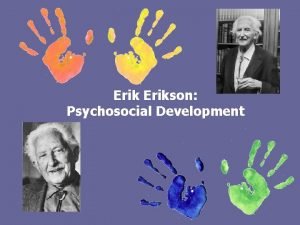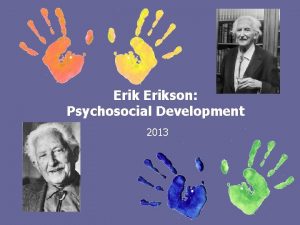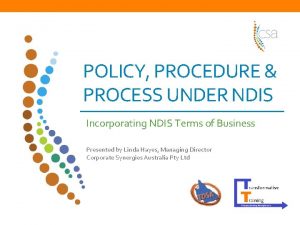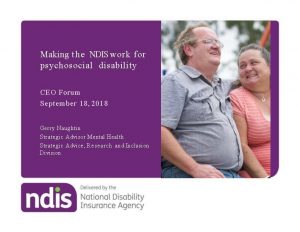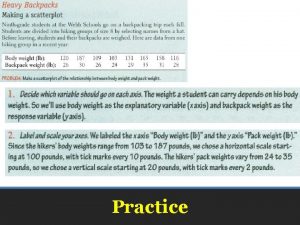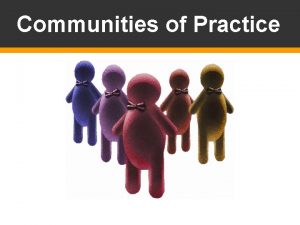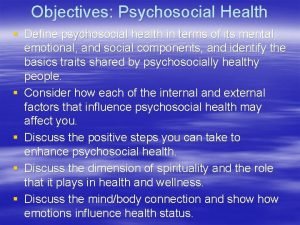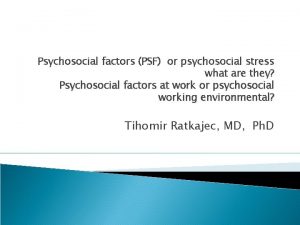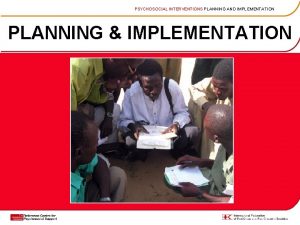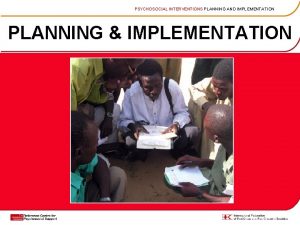Psychosocial NDIS Communities of Practice Co P Welcome




















- Slides: 20

Psychosocial NDIS Communities of Practice (Co. P)

Welcome to Country Garth Dodd Executive Officer Council of Aboriginal Elders

Local Area Coordination – Mission Australia Georgii Snowball, Regional Leader, NDIS LAC Partner, Mission Australia

Introduction to NDIS Access Brendan Livingston, NDIS Resource Co-ordinator, CAH PIR

Who is the NDIS for? Predicted total number of NDIS participants; 460, 000 people (all disabilities) “It is estimated that there are 600, 000 Australians living with severe and persistent mental illness of which 290, 000 require support periodically. It is anticipated that 64, 000 people with severe and persistent mental illness will be eligible to access the NDIS. ” https: //www. ndis. gov. au/medias/documents/mha-services/Mental-Health-Access-NDIS-and-Other-Services. pdf

Access criterion • the person has a disability that is attributable to one or more intellectual, cognitive, neurological, sensory or physical impairments or to one or more impairments attributable to a psychiatric condition; and Do I need a diagnosis? Section 24, NDIS Act 2013

Access Criterion continued • (b) the impairment or impairments are, or are • likely to be, permanent; and Who can make this decision? What information or evidence determines likelihood of permanence? ? ? Section 24, NDIS Act 2013

Access Criterion continued • • • (c) the impairment or impairments result in substantially reduced functional capacity to undertake, or psychosocial functioning in undertaking, one or more of the following activities: (i) communication; (ii) social interaction; (iii) learning; (iv) mobility; (v) self‑care; (vi) self‑management; and • Section 24, NDIS Act 2013

How might you describe significant functional impairment? “People who are eligible for an individualised NDIS plan generally need assistance (and will continue to need assistance throughout their life) to carry out key everyday tasks in at least one these areas: ” • Assistance includes things like physical assistance, guidance, supervision or prompting. To qualify for individualised support a person will: • �usually not be able to do most tasks within one of the areas listed above; and • �without support, have substantially reduced capacity to function in one of these areas. • Importantly the NDIA looks at both what a person can and cannot do. For example, someone who has substantially reduced capacity in self-management may be able manage their own small budget for incidental expenses but need another person’s assistance to make major life/financial decisions and budget. https: //www. ndis. gov. au/medias/documents/mha-general-information/Mental-Health-Access-General-Information. pdf

Mental Health Access Snapshots https: //www. ndis. gov. au/psychosocial/products. html

Summary • A lot of programs are contractually obliged to support their consumers to submit access requests for NDIS as part of determining continuity of support – there is an expectation that not everyone who applies is going to be eligible for the NDIS. • There are conflicting messages around evidence needs as we progress and learn more (from both sides) so we require patience as well as advocacy.

Morning tea

Issues with access, lessons learnt Natalie Berg, Advocate, Advocacy for Disability Access and Inclusion

Networking – NDIS Buzz Deb Milford, Line Manager, CAH PIR


Wrap Up Beverley Scott, Program Coordinator, CAH PIR

Evaluation • At last Co. P attendees were asked what was wanted at future Co. Ps: • • Access Planning Addressing special needs groups Tools Working in partnership Continuity of support Advocacy Appeals

Future Co. Ps • Tuesday the 4 th September. Focus on planning. • Tuesday the 4 th December. Focus will be reviews, appeals and advocacy. • March and June 2019. Dates and themes to be confirmed.

Co. P Portal www. neaminational. org. au/CAHPIR/NDIS/Co. P OR http: //bit. ly/2 Hmj. Rb 6

For more information Beverley Scott Program Coordinator Central Adelaide and Hills Partners in Recovery Phone (08) 8465 7050 E-mail beverley. scott@neaminational. org. au Web http: //www. neaminational. org. au/get-support/findservice/central-adelaide-and-hills-pir
 Secondary succession
Secondary succession Origin of communities of practice
Origin of communities of practice Feros care ndis
Feros care ndis Ndis sil quoting tool
Ndis sil quoting tool Ndis readiness checklist
Ndis readiness checklist Ndis behaviour support competency framework
Ndis behaviour support competency framework Ndis excel spreadsheet
Ndis excel spreadsheet Ndis orientation module
Ndis orientation module Ndis s48
Ndis s48 Ndis subcontracting
Ndis subcontracting David coyne ndis
David coyne ndis School leaver employment support 5
School leaver employment support 5 Ndis 6
Ndis 6 Cdrom.sys
Cdrom.sys Ndis 6
Ndis 6 Ndis behaviour support competency framework
Ndis behaviour support competency framework Stages of psychosocial development
Stages of psychosocial development Relaxation response technique
Relaxation response technique Psychosocial environment
Psychosocial environment Types of psychosocial support
Types of psychosocial support Psychosocial information
Psychosocial information
